Susan Sontag 《beauty》译文
英文经典欣赏

感动电影:《当幸福来敲门》:看完后能使人有不一样的感受,是一部让看他的每一人落泪你刚刚拿到大学文凭,雄心勃勃,希望在事业上大展身手,可是找工作的过程渐渐泯灭了你的雄心,四处碰壁后该怎么办?这时候,看这部片子。
《肖申克的救赎》:毫无疑问是一部好片子,没有动作,没有特技,甚至没有美人,却依然能深深打动观众,并且历经十几年而魅力不减。
“有一种鸟儿是永远也关不住的,因为它的每片羽翼上都沾满了自由的光辉。
”一个人能够在十五年痛苦的牢狱生活里,不放弃对自由的向往,这是一种怎样的精神力量?所以他成功了成功夺回了自由。
《肖申克的救赎》中有这样一句话:体制化是这样一种东西,一开始你排斥它,后来你习惯它,直到最后你离不开它。
想想看,我们的身体已经有多大一部分被体制化了?《奔腾年代》:一个不甘寂寞的商人,从自行车配件维修、到销售汽车、再到经营马匹,本身他就是一个社会发展的缩影、一个努力不息的形象,自身的经历成为他演讲有力的支持与鼓励。
《死亡诗社》:名字容易让人误解,其实这不是一部充满死亡气息的电影。
在这里,没有普拉斯那样的女人故事,也没有阴冷刺骨的文字。
相反,这应该归类于校园青春剧。
在这个严谨的威尔顿教会学校(男校)有着这样的四个口号,传统,荣誉,纪律,优秀。
校园里,有这样一群俊美如阿波罗的男孩。
他们的眼中闪着好奇的光芒,对爱和异性的憧憬,挣扎着奋起的力量,向往一次不计代价的独立的飞翔。
《美丽人生》:女主角嫁给了一个深爱自己的犹太人,为了这份爱,她放弃了优越的生活,甚至不在乎生命.丈夫虽然在集中营里丧命,爱却不会消亡.何况还有儿子相伴.《忠犬八公的故事》:主人公李察基尔偶然捡到这只可爱的狗儿,并与其成为朋友。
八公长大以后,学会了每天到车站去送主人公上班和等主人公下班,寒暑易,风雪打,八公一直坚持着。
某天,主人公心脏病突发,在工作的教室里去世,然而八公却不知道它的主人已经无法再回来,依然每天去等主人公,这一等就是10年。
最新新编英语教程6-U7-Beauty-中英翻译

BeautySusan SontagFor the Greeks, beauty was a virtue: a kind of excellence. Persons then were assumed to be what we now have to call lamely, enviously whole persons. If it did occur to the Greeks to distinguish between a person’s “inside” and “outside”, they still expected that inner beauty would be matched by beauty of the other kind. The well-born young Athenians who gathered around Socrates found it quite paradoxical that their hero was so intelligent, so brave, so honorable, so seductive and so ugly. One of Socrates main pedagogical acts was to be ugly and teach those innocent, no doubt splendid-looking disciples of his how full of paradoxes life really was.They may hav e resisted Socrates’ lessons. We do not. Several thousand years later, we are more wary of the enchantments of beauty. We not only split off with the greatest facility-the “inside” (character, intellect) from the “outside” (looks): but we are actually surp rised when someone who is beautiful is also intelligent, talent and good.It was principally the influence of Christianity that deprived beauty of the central place it had in classical ideals of human excellence (virtus in latin) to moral virtue only, Christianity set beauty adrift-as an alienated, arbitrary, superficial enchantment. And beauty has continued to lose prestige. For close to two centuries it has become a convention to attribute beauty to only one of the two sexes: the sex which, however Fair, is always Second. Associating beauty with women has put beauty even further on the defensive, morally.A beautiful woman, we say in English. But a handsome man. “Handsome” is the masculine equivalentof-and refusal of-a compliment which has accumulate certain demeaning overtones, by being resolved women only. That one can call a man in French and in Italian suggests that catholic countries, unlike those countries shaped by the Protestant version of Christianity, still retain some vestiges of the pagan admiration for beauty. But the differences, if one exists, is of degrees only. In every modern country that is Christian or post-Christian, women are the beautiful sex to the detriment of the notion of beauty as well as of women.To be called beautiful is th ought to name something essential to women’s character and concerns. (In contrast to men whose essence is to be strong or competent). It doesn’t take someone in the throes of advanced feminist awareness to perceive that the way women are taught to be involved with beauty encourages narcissism, reinforces dependence and immaturity. Everybody (women and men) knows that. For it is ”every body”, a whole society, that has identified with caring about what one is and does and only secondarily, if at all, about how one looks.) Given these stereotype, it is on wonder that beauty enjoys, at best, a rather mixed reputation.It is not, of course, the desire to be beautiful that is wrong but the obligation to be or to try. What is accepted by most women as a flattering idealization of their sex is a way of making women feel inferior to what they actually are, or normally grow to be. For the ideal of beauty is administered as a form ofself-oppression. Women are taught to see their bodies in parts, and to evaluate each part separately. Breasts, feet, hips, waistline neck, eyes, nose, complexion, hair, and so on, each in turn is submitted to an anxious, fretful, often despairing scrutiny. Even if some pass muster, some will always be found wanting. Nothing less than perfection will do.In men, good looks is a whole, something taken in at a glance. It does not need to be confirmed y givingmeasurements of different regions of the body, nobody encourages a man to dissect his appearance, feature by feature. As for perfection, that is considered trivial-almost unmanly. Indeed, in the ideally good-looking man a small imperfection or blemish is considered positively desirable. According to one movie critic (a woman) who is a declared Robert Redford fan, it is having that cluster of skin-colored moles on one cheek that saves Redford from being merely a “pretty face.” Think of the depreciation of women, as well as of beauty, that id implied in that judgment.“The privileges of beauty are immense.” said Cocteau. To be sure, beauty i s a form of power. And deservedly so. What is lamentable is that it is the only form of power that most women are encouraged to seek. This power is always conceived relation to men; it is not the power to do that but the power to attract. It is a power that negates itself. For this power is not one that can be chosen freely, at least, not by women, or renounced without social censure.To preen, for a woman, can never be jut a pleasure. It is also a duty. It is her work. If a woman dose real work, and even if she has clambered up to a leading position in politics, law, medicine, business, or whatever, she is always under pressure to a confess that she still works at bring attractive. But in so far as she is keeping up as one of the Fair Sex, she brings under suspicion her very capacity to be objective, professional, authoritative, thoughtful. Damned if they do-women are. And damned if they don’t.One could hardly ask for more important evidence of the dangers of considering persons as split between what is “inside” and what is “outside” than that interminable half-comic half-tragic tale, the oppression of women. How easy it is to start off by defining women as caretakers of their surfaces, and then to disparage them (or find them adorable) for being “superficial”. It is a crude trap, and it has worked for too long. But to get out of the trap requires that women get some critical distance from the excellence and privilege which is beauty, enough distance to see how much beauty itself has been abridged in order to prop up the mythology of the “feminine”. There should be a way of saving beauty from women, and for them.对于古希腊人来说,美丽是一种美德:一种出色表现。
综合英语教程五beauty英汉翻译
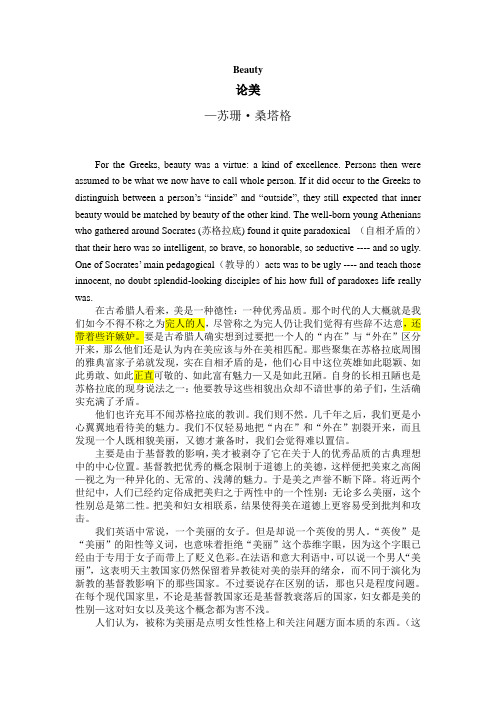
Beauty论美—苏珊·桑塔格For the Greeks, beauty was a virtue: a kind of excellence. Persons then were assumed to be what we now have to call whole person. If it did occur to the Greeks to distinguish between a person’s “inside” and “outside”, they still expected that inner beauty would be matched by beauty of the other kind. The well-born young Athenians who gathered around Socrates (苏格拉底) found it quite paradoxical (自相矛盾的)that their hero was so intelligent, so brave, so honorable, so seductive ---- and so ugly. One of Socrates’ main pedagogical (教导的)acts was to be ugly ---- and teach those innocent, no doubt splendid-looking disciples of his how full of paradoxes life really was.在古希腊人看来,美是一种德性:一种优秀品质。
那个时代的人大概就是我们如今不得不称之为完人的人,尽管称之为完人仍让我们觉得有些辞不达意,还带着些许嫉妒。
要是古希腊人确实想到过要把一个人的“内在”与“外在”区分开来,那么他们还是认为内在美应该与外在美相匹配。
Beauty译文
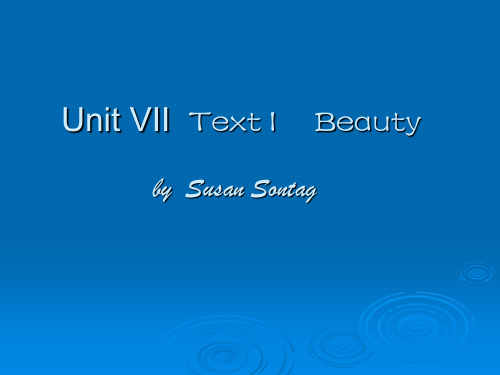
Background of Christianity
基督教是总称,包括三个教派:天主教、新教和 东正教。 十一世纪中叶,基督教罗马教庭分裂成东、 西两个教庭,东派拜占廷教庭自称“正教”,即 现在的东正教,信仰的是以俄罗斯为主的东欧国 家。十六世纪以马丁· 路德为代表的宗教改革使原 来的罗马公教分裂为新与旧两派。习惯上将旧教 称为天主教,信仰的主要有意大利、法国等国家。 中国习惯将新教称为基督教,信仰的国家主要有 英美德等国家。
Beauty alone makes all the world happy, and every being forgets its limitations as long as it experiences her enchantment. --- Friedrich von Schiller (1759 - 1805), German poet, playwright and historian.
Uni
by Susan Sontag
Susan Sontag and her works
Susan Sontag (1933-2004), American writer, known for her
philosophical writings on modern culture. During the 1960s and 1970s Sontag's essays and observations had a strong influence on the American counterculture. Her essay collections include Against Interpretation (反对阐释,1966), Styles of Radical Will (激进意志的风格,1969), and Under the Sign of Saturn (在土星的标志下,1980). She also wrote the novels The Benefactor (恩人,1963), Death Kit (死亡试剂盒,1967), The Volcano Lover (火山情人,1992), and In America (在美国,2000). Sontag‗s other works include the nonfiction books On Photography (论 摄影,1977), Illness as Metaphor (疾病的隐喻,1978), and AIDS and Its Metaphors (艾滋病及其隐喻,1989); and a collection of short stories.
《圣诞前夜》《再别康桥》《你是人间的四月天》英语美文赏析,附翻译

《圣诞前夜》《再别康桥》《你是人间的四月天》英语美文赏析,附翻译今天小编为大家整理的是关于《圣诞前夜》《再别康桥》《你是人间的四月天》英语美文赏析,这对大家的英语学习会很有帮助哦,希望大家可以好好利用起来,下面就让我们一起来学习一下吧。
一、圣诞前夜ON CHRISTMAS EVEA friend of mine named Paulreceived an automobilefrom his brother as Christmas present.我有个朋友,保罗在圣诞节那天收到了一份来自他哥哥的礼物一辆轿车On Christmas eve,when Paul came out of his office,a street urchinwas looking around the shining new car,admiring it.在圣诞前夜,当保罗从他的办公室走出来时,一个街头顽童正围着他的新车打转地看,非常羡慕。
"Is this your car, Mister?"he said.“这是您的汽车吗,先生?”他说。
Paul nodded,"My brother gave it to me for Christmas."保罗点了点头,“我哥哥给我的圣诞礼物。
The boy was astounded,"You mean your brother gave it to you, and didn't cost you anything?"小男孩诧异了,“你是说你哥哥给你的,不用花你一分钱?”"Boy, I wish..."he hesitated.“兄弟,我希望...”他迟疑了。
Of coursePaul knew what he was going to wish for. He was going to wishhe has a brother like that.But what the lad said jarred Paulall the way down his heels.保罗当然清楚他希望什么他希望他也有个那样的哥哥但这个小家伙说的话使保罗大吃了一惊"I wish,"the boy went on,"that I could be a brother like that." “我希望小男孩继续说道“我可以做一个那样的哥哥Paul looked at the boy in astonishment, then inpulsivly he added,"Would you like to take a ride in my car?"保罗惊奇地看着小男孩然后激动地说了句“你想不想做我的车去兜兜风?”"Oh, yes. I'd love that."“哦,想!我喜欢!”After a short ride,the boy turned his eyes aglow,said, "Mister, would you minddriving in front of my house?"跑了一小段路后,小男孩眼光水灵闪闪地说道,“先生,您可以把车开到我家门前吗?”Paul smiled a little.He thought he knew what the lad wanted.He wanted to show his neighboursthat he could ride home in a big automobile.But Paul was wrong again.保罗微微一笑。
综英5 Unit-11 Beauty by Susan Sontag

Author Works: (1963) The Benefactor 《恩主》 (1966) Against Interpretation (includes Notes on ―Camp‖) 《反对阐释》 (1977) On Photography 《论摄影》 (1978) Illness as Metaphor 《疾病的隐喻》 (1980) Under the Sign of Saturn《在土星的光环下》 2000 National Book Award for In America
新世纪高等院校英语专业本科系列教材(修订版) 综合教程第五册(第2版) 电子教案
Unit 11
Beauty
上海外语教育出版社 南京信息工程大学 刘杰海
Picture Activation | Pre-questions
Which of the above is beautiful? Why do you think so?
综合教程5(第2版)电子教案
综合教程5(第2版)电子教案
综合教程5(第2版)电子教案
综合教程5(第2版)电子教案
Picture Activation | Pre-questions
Note: We hardly can judge the above paintings‘ ―beauty‖, because ―beauty‖ itself is too abstract. In addition, different people may have different opinions about the concept. The question is: What is your OWN understanding of ―beauty‖?
Unit-11 Beauty by Susan Sontag
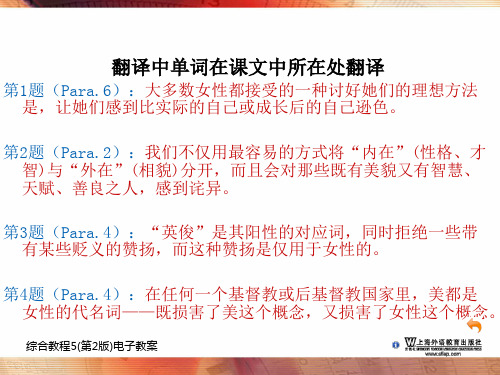
第1题(Para.6):大多数女性都接受的一种讨好她们的理想方法 是,让她们感到比实际的自己或成长后的自己逊色。 第2题(Para.2):我们不仅用最容易的方式将“内在”(性格、才 智)与“外在”(相貌)分开,而且会对那些既有美貌又有智慧、 天赋、善良之人,感到诧异。 第3题(Para.4):“英俊”是其阳性的对应词,同时拒绝一些带 有某些贬义的赞扬,而这种赞扬是仅用于女性的。
第4题(Para.4):在任何一个基督教或后基督教国家里,美都是 女性的代名词——既损害了美这个概念,又损害了女性这个概念。
综合教程5(第2版)电子教案
第5题(Para.5):没有超强女权意识的人都能感受到,教导女人 和美联系在一起其实是鼓励孤芳自赏,强化女性的依赖性和不 成熟。
第7题(Para.2):几千年以后,我们对于美的魔力更加谨小慎微。 第6题(Para.3):基督教将美德(拉丁语virtus)仅局限于道德层面, 使美的意思飘忽不定——它成了一种孤立、随意、浅薄的诱惑。 第8题(Para.10):然而,要摆脱这个陷阱需要女性与美的好处 和特权保持严格的距离,要有足够的距离让女性看清,为了支 撑“女性”这个神话,“美”这个概念有多少被删节了。应该 能找到一种办法将“美”从女性那里解救出来,并且留在女人 身上。
6. 我们的计算似乎出了点问题。 (adrift—Para.3) Something seems to have gone adrift in our calculation.
综合教程5(第2版)电子教案
Translating Sentences | Translating Passage
7. 对 不 太 熟 悉 的 人 , 我 不 太 轻 易 把 我 的 住 址 告 诉 他 们 。 (wary of—Para.2)
Susan Sontag 《beauty》译文
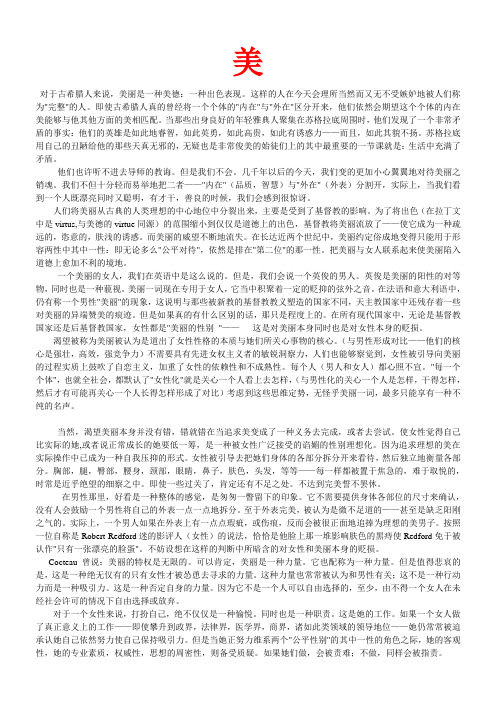
美对于古希腊人来说,美丽是一种美德:一种出色表现。
这样的人在今天会理所当然而又无不受嫉妒地被人们称为"完整"的人。
即使古希腊人真的曾经将一个个体的"内在"与"外在"区分开来,他们依然会期望这个个体的内在美能够与他其他方面的美相匹配。
当那些出身良好的年轻雅典人聚集在苏格拉底周围时,他们发现了一个非常矛盾的事实:他们的英雄是如此地睿智,如此英勇,如此高贵,如此有诱惑力——而且,如此其貌不扬。
苏格拉底用自己的丑陋给他的那些天真无邪的,无疑也是非常俊美的始徒们上的其中最重要的一节课就是:生活中充满了矛盾。
他们也许听不进去导师的教诲。
但是我们不会。
几千年以后的今天,我们变的更加小心翼翼地对待美丽之销魂。
我们不但十分轻而易举地把二者——"内在"(品质,智慧)与"外在"(外表)分割开,实际上,当我们看到一个人既漂亮同时又聪明,有才干,善良的时候,我们会感到很惊讶。
人们将美丽从古典的人类理想的中心地位中分裂出来,主要是受到了基督教的影响。
为了将出色(在拉丁文中是virtus,与美德的virtue同源)的范围缩小到仅仅是道德上的出色,基督教将美丽流放了——使它成为一种疏远的,恣意的,肤浅的诱惑。
而美丽的威望不断地流失。
在长达近两个世纪中,美丽约定俗成地变得只能用于形容两性中其中一性:即无论多么"公平对待",依然是排在"第二位"的那一性。
把美丽与女人联系起来使美丽陷入道德上愈加不利的境地。
一个美丽的女人,我们在英语中是这么说的。
但是,我们会说一个英俊的男人。
英俊是美丽的阳性的对等物,同时也是一种藐视。
美丽一词现在专用于女人,它当中积聚着一定的贬抑的弦外之音。
在法语和意大利语中,仍有称一个男性"美丽"的现象,这说明与那些被新教的基督教教义塑造的国家不同,天主教国家中还残存着一些对美丽的异端赞美的痕迹。
专业学位硕士研究生英语教程15
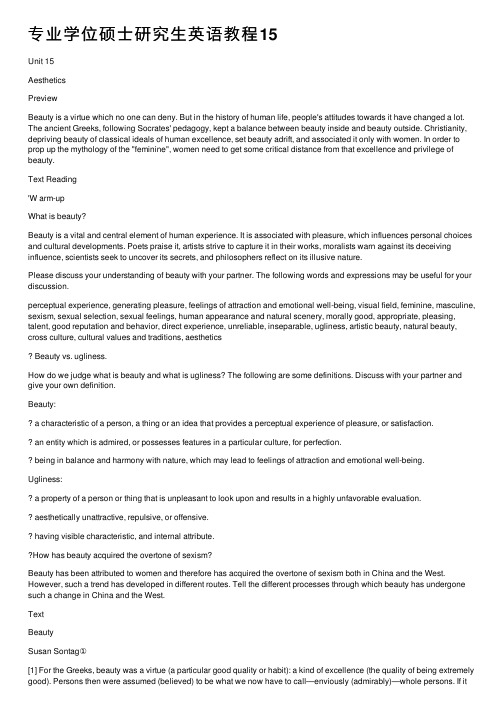
专业学位硕⼠研究⽣英语教程15Unit 15AestheticsPreviewBeauty is a virtue which no one can deny. But in the history of human life, people's attitudes towards it have changed a lot. The ancient Greeks, following Socrates' pedagogy, kept a balance between beauty inside and beauty outside. Christianity, depriving beauty of classical ideals of human excellence, set beauty adrift, and associated it only with women. In order to prop up the mythology of the "feminine", women need to get some critical distance from that excellence and privilege of beauty.Text Reading'W arm-upWhat is beauty?Beauty is a vital and central element of human experience. It is associated with pleasure, which influences personal choices and cultural developments. Poets praise it, artists strive to capture it in their works, moralists warn against its deceiving influence, scientists seek to uncover its secrets, and philosophers reflect on its illusive nature.Please discuss your understanding of beauty with your partner. The following words and expressions may be useful for your discussion.perceptual experience, generating pleasure, feelings of attraction and emotional well-being, visual field, feminine, masculine, sexism, sexual selection, sexual feelings, human appearance and natural scenery, morally good, appropriate, pleasing, talent, good reputation and behavior, direct experience, unreliable, inseparable, ugliness, artistic beauty, natural beauty, cross culture, cultural values and traditions, aestheticsBeauty vs. ugliness.How do we judge what is beauty and what is ugliness? The following are some definitions. Discuss with your partner and give your own definition.Beauty:a characteristic of a person, a thing or an idea that provides a perceptual experience of pleasure, or satisfaction.an entity which is admired, or possesses features in a particular culture, for perfection.being in balance and harmony with nature, which may lead to feelings of attraction and emotional well-being. Ugliness:a property of a person or thing that is unpleasant to look upon and results in a highly unfavorable evaluation.aesthetically unattractive, repulsive, or offensive.having visible characteristic, and internal attribute.How has beauty acquired the overtone of sexismBeauty has been attributed to women and therefore has acquired the overtone of sexism both in China and the West. However, such a trend has developed in different routes. Tell the different processes through which beauty has undergone such a change in China and the West.TextBeautySusan Sontag①[1] For the Greeks, beauty was a virtue (a particular good quality or habit): a kind of excellence (the quality of being extremely good). Persons then were assumed (believed) to be what we now have to call—enviously (admirably)—whole persons. If itdid occur to the Greeks to distinguish between a person's "inside" and "outside", they still expected that inner beauty would be matched by beauty of the other kind. The well-born (from a rich family or a family of high social class出⾝名门,出⾝⾼贵的) young Athenians who gathered around Socrates②found it quite paradoxical (absurd, illogical, unexpected荒谬的) that their hero was so intelligent, so brave, so honorable, so seductive (sexually attractive)—and so ugly. One of Socrates②main pedagogical (教育学的, 教学法的) acts was to be ugly—and teach those innocent, no doubt splendid-looking disciples (persons who believe in and follow the teachings of a religious or political leader) of his how full of paradoxes (contrarieties⽭盾, 相反物) life really was.[2] They may have resisted Socrates' lesson. We do not. Several thousand years later, we areof) the enchantments (the state of being under a magic spell) of beauty.from, a larger object or group)—with the greatest facility (a natural ability to learn or do sth easily)—the "inside" (character, intellect) from the "outside" (looks); but we are actually surprised when someone who is beautiful is also intelligent, talented (gifted), good.[3] It was principally (chiefly) the influence of Christianity (the religion that is based on the teachings of Jesus Christ and the belief that he was the son of God) that deprived beauty of the central place it had in classical (traditional in style or idea, connected with or influenced by the culture of ancient Greece and Rome) ideals of human excellence. By limiting excellence (virtues in Latin) to moral virtue only, Christianity set beauty adrift (adj. no longer attached or fixed in the right position)—as an alienated (foreign), arbitrary (subjective, not seeming to be based on a reason, system or plan and sometimes seeming unfair), superficial (not concerned with anything serious or important and lacking any depth of understanding or feeling) enchantment (attractiveness, charm). And beauty has continued to lose prestige (the respect and admiration). For close to (=nearly) two centuries it has become a convention (rule, habit or tradition) to attribute beauty to (to say or believe that sb is responsible for doing sth) only one of the two sexes: the sex, which, however Fair is always Second. Associating beauty with women had put beauty even further on the defensive (protecting sb/ sth against attack), morally (spiritually)③.[4] A beautiful woman, we say in English. But a handsome man. "Handsome" is the masculine equivalent (a thing, amount, word, etc. that is equivalent to sth else) of—and refusal of—a compliment (praise) which has accumulated (amass, build up) certain demeaning (humiliating) overtones (an attitude or an emotion that is suggested and is not expressed in a direct way暗⽰), bybeing reserved for women only. That one call a man "beautiful" in French and Italian suggests that Catholic (=Roman Catholic) countries—unlike those countries shaped by the Protestant (a member of a part of the Western Christian Church that separated from the Roman Catholic Church in the 16th century新教徒的, 清教徒的) version (a form of sth that is slightly different from an earlier form or from other forms of the same thing版本) of Christianity—still retain (keep) some vestiges (remains遗迹, 痕迹) of the pagan (a person who holds religious beliefs that are not part of any of the world's main religions异教徒) admiration for beauty. But the difference, if one exists, is of degree only. In every modern country that is Christian or post-Christian, women are the beautiful sex—to be detriment (the act of causing harm or damage; sth that causes harm or damage损害, 损害物) of the nation as well as of women.[5] To be called beautiful is thought to name something essential to women's character and concerns (desires). (In contrast to men—whose essence (the most important quality or feature of sth) is to be strong, or effective, or competent.) It does not take someone in the throes (violent pains, especially at the moment of death) of advanced feminist awareness④to perceive that the way women are taught to be involved with beauty encourages narcissism (the habit of admiring yourself too much, especially your appearance⾃恋), reinforces dependence and immaturity. Everybody (women and men) knows that. For it is "everybody", a whole society that has identified (considered) being feminine (having the qualities or appearance considered to be typical of women; connected with women) with caring about how one looks. (In contrast to being masculine—which is identified with about what one is and does and only secondarily, if at all, about how one looks.) Given these stereotypes (a fixed idea or image that many people have of a particular type of person or thing, but which is often not true in reality), it is no wonder that beauty enjoys, at best, a rather mixed (repute->) reputation (credit, prestige信⽤,名声).[6] It is not, of course, the desire to be beautiful that is wrong but the obligation (commitment, the state of being forced to do sth because it is your duty, or because of a law, etc责任) to be—or to try⑤. What is accepted by most women as a flattering (saying nice things about sb/sth) (idealize: to consider or represent sb/ sth as being perfect or better than they really are; ->) idealization () of their sex is a way of making women feel inferior to what they actually are—or normally grow to be. For the ideal of beauty is administered as a form of self-oppression (⾃我施压). Women are taught to see their bodies in parts, and to evaluate each part separately. Breasts, feet, hips, waistline (腰围), neck, eyes, nose, complexion (肤⾊), hair, and so on—each in turn is submitted to (subjected to) an anxious, fretful (behaving in a way that shows you are unhappy or uncomfortable烦燥的), often despairing (desperate绝望的, 失望的) scrutiny (examination). Even if some pass muster (summon, gather), some will always be found wanting. Nothing less than perfection will do⑥.[7] In men, good looks is a whole, something taken in at a glance. It does not need to be confirmed by giving measurements of different regions (part) of the body; nobody encourages a man to dissect (to cut up a dead person, animal or plant in order to study it, or to study sth closely and/or discuss it in great detail解剖,分开来研究) his appearance, feature (a part of sb's face such as their nose, mouth and eyes⾯貌的⼀部分(眼,⼝,⿐等)特征, 容貌, 特⾊, 特写) by feature. As for perfection, that is considered trivial (small or unimportant) —almost unmanly (not having the qualities that are admired or expected in a man). Indeed, in the ideally good-looking man a small imperfection or blemish (a mark on the skin or on an object that spoils it and makes it look less beautiful or perfect瑕疵) is considered positively desirable. According to one movie critic (a woman) who is a declared Robert Redford fan, it is having that cluster (a group of things of thesame type that grow or appear close together) of skin-colored moles (胎块, 鼹⿏) on one cheek that saves Redford from being merely a "pretty face (⼩⽩脸)". Think of the (appreciate<->depreciate to become less valuable over a period of time贬值->) depreciation of women—as well as beauty—that is implied in that judgment⑦.[8] "The privileges (a special right or advantage that a particular person or group of people has) of beauty are immense (enormous)," said Cocteau. To be sure, beauty is a form of power. And deservedly (in the way that is deserved; correctly) so. What is lamentable (deplorable, regrettable) is that it is the only form of power that most women are encouraged to seek. This power is always conceived (to form an idea, a plan, etc. in your mind; to imagine sth) in relation to men; it is not the power to do but the power to attract. It is a power that negates (to stop sth from having any effect否定, 拒绝) itself. For this power is not one that can be chosen freely—at least, not by women—or renounced (give up放弃, disown断绝关系) without social censure (strong criticism责难).[9] To preen (to spend a lot of time making yourself look attractive and then ad miring your appearance打扮), for a woman, can never be just a pleasure. It is also a duty. It is her work. If a woman does real work—and even if she has clambered(=climbed攀登) up to a leading position in politics, law, medicine, business, or whatever—she is always under pressure to confess that she still works at being attractive. But in so far as she is keeping up as one of the Fair Sex, she brings under suspicion her very capacity (ability, competence) to be objective, professional, authoritative, thoughtful (considerate, kind). Damned if they do—women are. And damned if they don't⑧.[10] One could hardly ask for more important evidence of the dangers of considering persons as split between what is "inside" and what is "outside" than that interminable half-comic half-tragic tale (story), the oppression of women. How easy it is to off, start out, begin) bydefining women as caretakers of their surfaces,look down upon蔑视) them (or find them adorable (lovable, attractive"superficial". It is a crude (offensive or rude, especially about sex拙劣的) trap (trick), and it has worked for too long. But to get out of the trap requires that women get some critical distance from that excellence and privilege which is beauty, enough distance to see how much beauty itself has been abridged (reduced or be shortened删节的) in order to prop up (support) the mythology (ideas that many people think are true but that do not exist or are false神话) of the "feminine". There should be a way of saving beauty from (protecting sth. from damage) women—and for them.Notes①Susan Sontag (1933-2004): American essayist, short story writer, and novelist, a leading commentator on modern culture. Sontag also wrote screenplays and directed films. She had a great impact on experimental art in the 1960s and 1970s, and she introduced many new stimulating ideas to American culture.②Socrates (苏格拉底,469 Bc⼀399 Bc):a Greek philosopher.③Associating beauty ... morally: Beauty lost its central place and prestige due to the influence of Christianity and the fact that beauty was used only to refer to women made it even more degraded.④It does not take someone in the throes... : It does not take someone much effort... / It is quite easy...⑤It is ... to try: Here, in this sentence, beauty as a freedom of choice is emphasized.⑥Nothing less than perfection will do: People tend to hold a critical, almost fault- finding attitude towards beauty in women, wishing that every part of the body were perfect.⑦Think of ... judgment: An ideally good-looking man needs to be imperfect, while an ideally beautiful woman must be perfect.⑧Damned if they do—women are. And damned if they don't: If they have the capacity, they are wrong, and if they lack such capacity, they are also wrong. This shows a very paradoxical attitude towards women.W ord Bankabridge:to make sth. shorter删节,缩略administer:to manage or direct管理alienate:to make someone unwilling to give support使疏远arbitrary:based on personal opinion rather than facts or reason任意的,随意的assume:to believe sth. to be true without strong proof; to expect假设;假定blemish:sth. that spoils perfection瑕疵,污点complexion:the natural color or appearance of the skin, esp. of the face⾯⾊;肤⾊conceive:to become pregnant with (a child) 孕育confess:to admit (a fault, crime etc) 承认;坦⽩demean:to cause to lose sense of personal pride贬损,降低⾝份detriment:the condition of suffering harm or damage损害,伤害disciple:a follower信徒disparage:to speak about without respect贬低,轻视dissect:to cut up so as to study the shape and relationship of the parts, as medical students do 解剖,切开enchantment: a delightful influence or feeling of delight魅⼒,着迷honorable:deserving honor值得尊敬的inferior:not good or less good in quality or value次的,差的lamentable:very unsatisfactory令⼈惋惜的,可叹的masculine:of or having qualities suitable for a man男性的,阳刚的narcissism:too great love for one's own abilities or physical appearance⾃恋,⾃我陶醉overtone:things that are suggested but not shown or stated clearly含义,弦外之⾳pagan:of a person who is not a believer of any of the chief religions of the world异教徒的paradox:a statement that contradicts itself悖论pedagogy:the practice of teaching or the study of teaching methods教学法,教育学preen:to dress up打扮privilege:a special advantage limited to a particular person or group特权,特殊待遇renounce:to give up (a claim) 声明放弃scrutiny:a close study or look仔细检查,详审seductive:very desirable or attractive有魅⼒的trivial:of little worth or importance琐碎的,没有价值的vestige:a sign, mark, track, or other proof that sb. or sth. formerly existed痕迹,残余Phrases and Expressionsattribute...to:to believe (sth.) to be the result or work of归因于,认为是…的结果be wary of:to be careful of谨防,谨慎deprive...of:to take sth. away from somebody剥夺distinguish:between to make a difference between区分,区别identify...with:to share feelings or ideas of others; to consider as similar to与…共鸣;视……为⼀体pass muster:to be accepted as satisfactory通过,合格prop up:to support⽀撑,⽀持set...adrift:to make sth. unfastened or loose使漂浮submit...to:to offer sth. to sb. for consideration上交,提交Reading ComprehensionI. Choose the best for each of the following.1. In Para. 1, we can know that in ancient Greece, _____.A. there used to be the match of "inside" beauty and "outside" beautyB. inner beauty would be matched by beauty of the other kindC. "outside" beauty was more important than "inner" beautyD. one could be beautiful "inside" and ugly "outside"2. Beauty has acquired the implication of sexism mainly because of _____.A. the pedagogical acts of SocratesB. the influence of JesusC. men's ill intentionD. its being attributed to women3. The sentence "To be called beautiful is thought to name something essential to women's character and concerns." in Para.5 implies _____.A. women only care about their looksB. beauty is women's obligationC. women are beautifulD. women are not intelligent4. In Para. 9, men's attitude towards women's beauty is _____.A. disgustingB. confusingC. contradictoryD. changeable5. The author's tone in describing beauty is _____.A. appreciativeB. negativeC. objectiveD. criticalII. Complete the following summary of the text by filling in the blanks with words. The initial letter of each word has been given to you.Beauty has (1) acquired certain demeaning (2) overtones with the passage of time. In ancient Greece, beauty was considered a (3) virtue and it had nothing negative at all. If there was really a need to make a distinction between the innerbeauty and oute beauty at all, the Greeks stressed the (4) match between the "inside" and the "outside". However, due to the influence of Christianity, beauty lost its (5) prestige. For close to two centuries, beauty has continuously been downgraded since it was (6) attributed only to women.Today, beauty has taken some coloring of sexism. Beauty is not a free choice or individual development any more. It has become a (7) duty and oppression for women. The attitude of the society towards women's beauty is also quite (8) paradox. On the one hand, women are defined as the Fair Sex, as "caretakers of their surfaces"; on the other hand, men look down upon women and describe them as being "superficial". To get out from this trap set by the society, particularly men, women themselves have to take some actions. They need to (9) d themselves enough from beauty, which is that excellence and privilege only attributed to them, to know the rationale which (10) backs the mythology of the "feminine".VocabularyI. Choose the answer that best completes each sentence.1. The bank is very _____ about lending money.A. carefulB. cautiousC. waryD. productive2. The award was _____ to the famous U.S. physicist.A. grantedB. distributedC. attributedD. associated3. She is very beautiful, but she has a _____ voice.A. feminineB. masculineC. manlyD. womanly4. She tried to _____ her balance, but failed.A. retainB. remainC. containD. detain5. The drug has no _____ on cancer.A. treatmentB. influenceC. affectD. effect6. After a period of exercise, she has a fair _____.A. faceB. lookC. appearanceD. complexion7. Y our prompt shipment will be _____.A. likedB. enjoyedC. pleasedD. appreciated8. In some countries, education is a _____ enjoyed only by the upper class.A. rightB. privilegeC. dutyD. obligation9. My advice was completely _____.A. ignoredB. negligentC. snoredD. stored10. Experience is a revelation in the light of which we _____ our error of youth for those of aged.A. renouncedB. denouncedC. pronouncedD. announcedII. Fill in the blanks with the words or phrases given below. Change the form where necessary. virtue occur to paradoxical deprive arbitraryvestige detrimental conceive blemish pass musteridentify inferior scrutiny negate disparage1. The president was engrossed in his job, which was detrimental to his health.2. In the exam, most of them passed muster, but still there were a few who failed.3. I don't mean to disparage your achievements.4. Most presidents in this African country are arbitrary rulers. They don't care the life of their people.5. It occurred to me that I forgot to lock the door.6. Popular music is often considered to be inferior to classical music.7. He was not the "tough guy" the public identify him with.8. Ted was a paradox: a loner who loved to chat to strangers.9. The criminal was deprived of political rights after he was sentenced.10. The documents should be available for public scrutiny.II. TranslationPut the following paragraph into English.基督教把美归于⼥性。
(完整word版)beauty译文
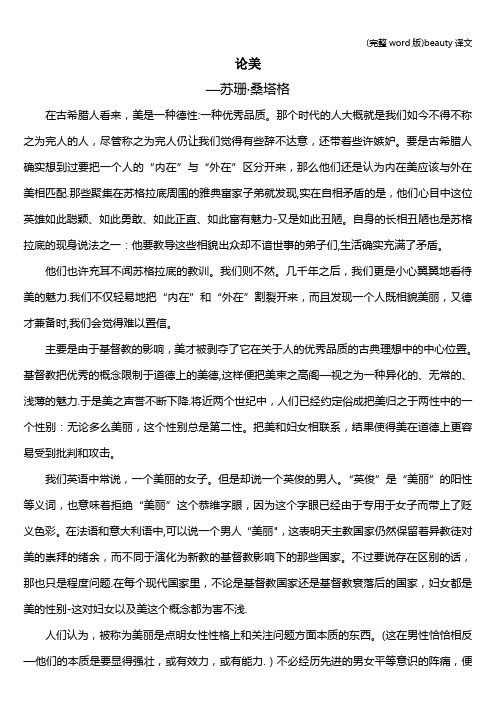
论美—苏珊·桑塔格在古希腊人看来,美是一种德性:一种优秀品质。
那个时代的人大概就是我们如今不得不称之为完人的人,尽管称之为完人仍让我们觉得有些辞不达意,还带着些许嫉妒。
要是古希腊人确实想到过要把一个人的“内在”与“外在”区分开来,那么他们还是认为内在美应该与外在美相匹配.那些聚集在苏格拉底周围的雅典富家子弟就发现,实在自相矛盾的是,他们心目中这位英雄如此聪颖、如此勇敢、如此正直、如此富有魅力-又是如此丑陋。
自身的长相丑陋也是苏格拉底的现身说法之一:他要教导这些相貌出众却不谙世事的弟子们,生活确实充满了矛盾。
他们也许充耳不闻苏格拉底的教训。
我们则不然。
几千年之后,我们更是小心翼翼地看待美的魅力.我们不仅轻易地把“内在”和“外在”割裂开来,而且发现一个人既相貌美丽,又德才兼备时,我们会觉得难以置信。
主要是由于基督教的影响,美才被剥夺了它在关于人的优秀品质的古典理想中的中心位置。
基督教把优秀的概念限制于道德上的美德,这样便把美束之高阁—视之为一种异化的、无常的、浅薄的魅力.于是美之声誉不断下降.将近两个世纪中,人们已经约定俗成把美归之于两性中的一个性别:无论多么美丽,这个性别总是第二性。
把美和妇女相联系,结果使得美在道德上更容易受到批判和攻击。
我们英语中常说,一个美丽的女子。
但是却说一个英俊的男人。
“英俊”是“美丽”的阳性等义词,也意味着拒绝“美丽”这个恭维字眼,因为这个字眼已经由于专用于女子而带上了贬义色彩。
在法语和意大利语中,可以说一个男人“美丽",这表明天主教国家仍然保留着异教徒对美的崇拜的绪余,而不同于演化为新教的基督教影响下的那些国家。
不过要说存在区别的话,那也只是程度问题.在每个现代国家里,不论是基督教国家还是基督教衰落后的国家,妇女都是美的性别-这对妇女以及美这个概念都为害不浅.人们认为,被称为美丽是点明女性性格上和关注问题方面本质的东西。
(这在男性恰恰相反—他们的本质是要显得强壮,或有效力,或有能力.)不必经历先进的男女平等意识的阵痛,便能认识到,教会妇女把自己和美联系起来,这就是助长自恋倾向,加深依赖性和不成熟状态。
给博尔赫斯的一封信
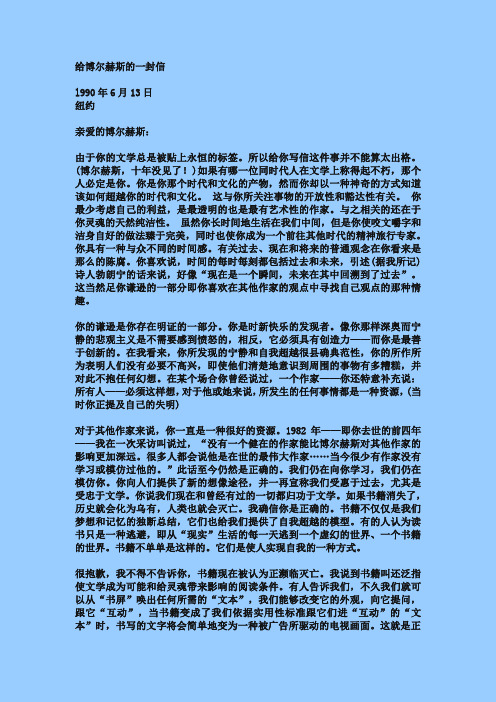
给博尔赫斯的一封信l990年6月13日纽约亲爱的博尔赫斯:由于你的文学总是被贴上永恒的标签。
所以给你写信这件事并不能算太出格。
(博尔赫斯,十年没见了!)如果有哪一位同时代人在文学上称得起不朽,那个人必定是你。
你是你那个时代和文化的产物,然而你却以一种神奇的方式知道该如何超越你的时代和文化。
这与你所关注事物的开放性和豁达性有关。
你最少考虑自己的利益,是最透明的也是最有艺术性的作家。
与之相关的还在于你灵魂的天然纯洁性。
虽然你长时间地生活在我们中间,但是你使咬文嚼字和洁身自好的做法臻于完美,同时也使你成为一个前往其他时代的精神旅行专家。
你具有一种与众不同的时间感。
有关过去、现在和将来的普通观念在你看来是那么的陈腐。
你喜欢说,时间的每时每刻都包括过去和未来,引述(据我所记)诗人勃朗宁的话来说,好像“现在是一个瞬间,未来在其中回溯到了过去”。
这当然足你谦逊的一部分即你喜欢在其他作家的观点中寻找自己观点的那种情趣。
你的谦逊是你存在明证的一部分。
你是时新快乐的发现者。
像你那样深奥而宁静的悲观主义是不需要感到愤怒的,相反,它必须具有创造力——而你是最善于创新的。
在我看来,你所发现的宁静和自我超越很县确典范性,你的所作所为表明人们没有必要不高兴,即使他们清楚地意识到周围的事物有多糟糕,并对此不抱任何幻想。
在某个场合你曾经说过,一个作家——你还特意补充说:所有人——必须这样想,对于他或她来说,所发生的任何事情都是一种资源,(当时你正提及自己的失明)对于其他作家来说,你一直是一种很好的资源。
1982年——即你去世的前四年——我在一次采访叫说过,“没有一个健在的作家能比博尔赫斯对其他作家的影响更加深远。
很多人都会说他是在世的最伟大作家……当今很少有作家没有学习或模仿过他的。
”此话至今仍然是正确的。
我们仍在向你学习,我们仍在模仿你。
你向人们提供了新的想像途径,并一再宣称我们受惠于过去,尤其是受忠于文学。
你说我们现在和曾经有过的一切都归功于文学。
疾病叙事与伦理关系——《床上的爱丽斯》的隐喻言说
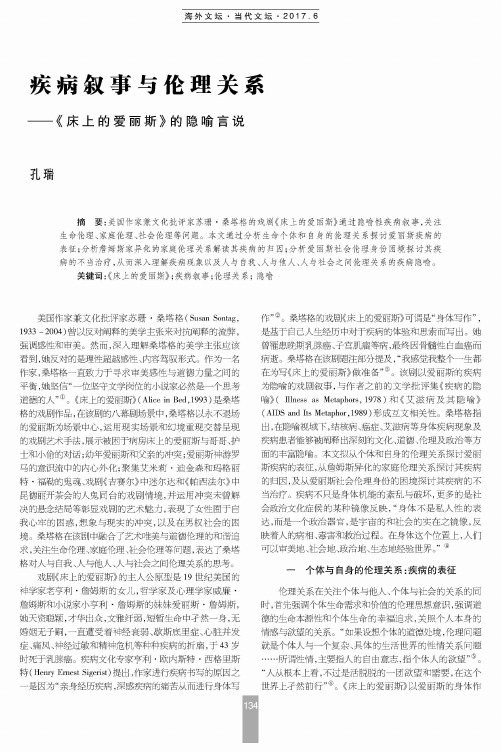
疾病叙事与伦理关系—《床上的爱丽斯》的隐喻言说孔瑞摘要:美国作家兼文化批评家苏珊•桑塔格的戏剧《床上的爱丽斯》通过隐喻性疾病叙事,关注 生命伦理、家庭伦理、社会伦理等问题。
本文通过分析生命个体和自身的伦理关系探讨爱丽斯疾病的 表征;分析詹姆斯家异化的家庭伦理关系解读其疾病的归因;分析爱丽斯社会伦理身份困境探讨其疾 病的不当治疗,从而深入理解疾病现象以及人与自我、人与他人、人与社会之间伦理关系的疾病隐喻。
关键词:《床上的爱丽斯》;疾病叙事;伦理关系;隐喻美国作家兼文化批评家苏珊•桑塔格(S usan Sontag, 1933 - 2004)曾以反对阐释的美学主张来对抗阐释的流弊,强调感性和审美。
然而,深人理解桑塔格的美学主张应该 看到,她反对的是理性超越感性、内容驾驭形式。
作为一名 作家,桑塔格一直致力于寻求审美感性与道德力量之间的 平衡,她坚信“一位坚守文学岗位的小说家必然是一个思考 道德的人”①。
《床上的爱丽斯》Alice in Bed,1993)是桑塔 格的戏剧作品,在该剧的八幕剧场景中,桑塔格以永不退场 的爱丽斯为场景中心,运用现实场景和幻境重现交替呈现 的戏剧艺术手法,展示被困于病房床上的爱丽斯与哥哥、护 士和小偷的对话;幼年爱丽斯和父亲的冲突;爱丽斯神游罗 马的意识流中的内心外化;聚集艾米莉•迪金森和玛格丽 特•福勒的鬼魂、戏剧《吉赛尔》中迷尔达和《帕西法尔》中昆德丽开茶会的人鬼同台的戏剧情境,并运用冲突未曾解 决的悬念结局等彰显戏剧的艺术魅力,表现了女性囿于自 我心牢的困惑,想象与现实的冲突,以及在男权社会的困 境。
桑塔格在该剧中融合了艺术唯美与道德伦理的和谐追 求,关注生命伦理、家庭伦理、社会伦理等问题,表达了桑塔 格对人与自我、人与他人、人与社会之间伦理关系的思考。
戏剧《床上的爱丽斯》的主人公原型是19世纪美国的 神学家老亨利•詹姆斯的女儿,哲学家及心理学家威廉•詹姆斯和小说家小亨利•詹姆斯的妹妹爱丽斯•詹姆斯,她天资聪颖,才华出众,文雅纤弱,短暂生命中孑然一身,无 婚姻无子嗣,一直遭受着神经衰弱、歇斯底里症、心脏并发 症、痛风、神经过敏和精神危机等种种疾病的折磨,于43岁 时死于乳腺癌。
Beauty-Susan-Sontag
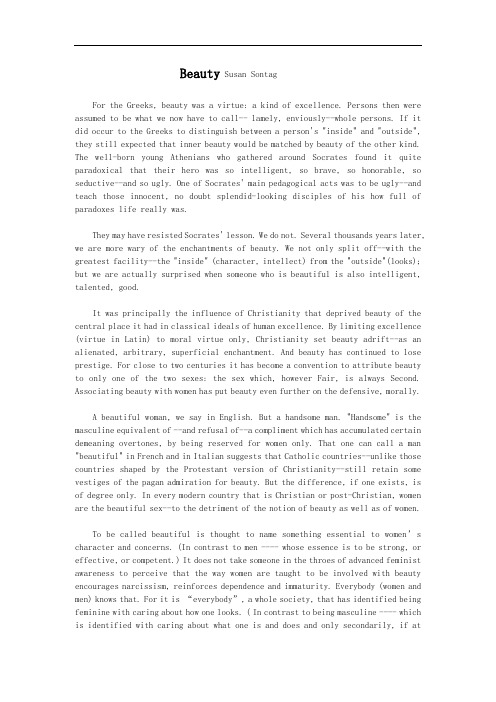
Beauty Susan SontagFor the Greeks, beauty was a virtue: a kind of excellence. Persons then were assumed to be what we now have to call-- lamely, enviously--whole persons. If it did occur to the Greeks to distinguish between a person's "inside" and "outside", they still expected that inner beauty would be matched by beauty of the other kind. The well-born young Athenians who gathered around Socrates found it quite paradoxical that their hero was so intelligent, so brave, so honorable, so seductive--and so ugly. One of Socrates' main pedagogical acts was to be ugly--and teach those innocent, no doubt splendid-looking disciples of his how full of paradoxes life really was.They may have resisted Socrates' lesson. We do not. Several thousands years later, we are more wary of the enchantments of beauty. We not only split off--with the greatest facility--the "inside" (character, intellect) from the "outside"(looks); but we are actually surprised when someone who is beautiful is also intelligent, talented, good.It was principally the influence of Christianity that deprived beauty of the central place it had in classical ideals of human excellence. By limiting excellence (virtue in Latin) to moral virtue only, Christianity set beauty adrift--as an alienated, arbitrary, superficial enchantment. And beauty has continued to lose prestige. For close to two centuries it has become a convention to attribute beauty to only one of the two sexes: the sex which, however Fair, is always Second. Associating beauty with women has put beauty even further on the defensive, morally.A beautiful woman, we say in English. But a handsome man. "Handsome" is the masculine equivalent of --and refusal of--a compliment which has accumulated certain demeaning overtones, by being reserved for women only. That one can call a man "beautiful" in French and in Italian suggests that Catholic countries--unlike those countries shaped by the Protestant version of Christianity--still retain some vestiges of the pagan admiration for beauty. But the difference, if one exists, is of degree only. In every modern country that is Christian or post-Christian, women are the beautiful sex--to the detriment of the notion of beauty as well as of women.To be called beautiful is thought to name something essential to women’s character and concerns. (In contrast to men ---- whose essence is to be strong, or effective, or competent.) It does not take someone in the throes of advanced feminist awareness to perceive that the way women are taught to be involved with beauty encourages narcissism, reinforces dependence and immaturity. Everybody (women and men) knows that. For it is “everybody”, a whole society, that has identified being feminine with caring about how one looks. ( In contrast to being masculine ---- which is identified with caring about what one is and does and only secondarily, if atall, about how one looks. ) Given these stereotypes, it is no wonder that beauty enjoys, at best, a rather mixed reputation.|It is not, of course, the desire to be beautiful that is wrong but the obligation to be ---- or to try. What is accepted by most women as a flattering idealization of their sex is a way of making women feel inferior to what they actually are ---- or normally grow to be. For the ideal of beauty is administered as a form of self-oppression. Women are taught to see their bodies in parts, and to evaluate each part separately. Breasts, feet, hips, waistline, neck, eyes, nose, complexion, hair, and so on ---- each in turn is submitted to an anxious, fretful, often despairing scrutiny. Even if some pass muster, some will always be found wanting. Nothing less than perfection will do.In men, good looks is a whole, something taken in at a glance. It does not need to be confirmed by giving measurements of different regions of the body, nobody encourages a man to dissect his appearance, feature by feature. As for perfection, that is considered trivial ---- almost unmanly. Indeed, in the ideally good-looking man a small perfection or blemish is considered positively desirable. According to one movie critic ( a woman ) who is declared Robert Redford fan, it is having that cluster of skin-colored moles on one neck that saves Redford from being merely a “pretty face.” Think of the depreciation of women ---- as well as of beauty ---- that is implied in that judgment.“The privileges of beauty are immense,” said Cocteau. To be sure, beauty is a form of power. And deservedly so. What is lamentable is that it is the only form of power that most women are encouraged to seek. This power is always conceived in relation to men; it is a power that negates itself. For this power is not one that can be chosen freely ---- at least, not by women ---- or renounced without social censure.To preen, for a woman, can never be just a pleasure. It is also a duty. It is her work. If a woman does real work ---- and even if she clambered up to a leading position in politics, law, medicine, business, or whatever ---- she is always under pressure to confess that she still works at being attractive. But in so far as she is keeping up as one of the Fair Sex, she brings under suspicion her very capacity to be objective, professional, authoritative, thoughtful. Damned if they do ---- women are. And damned if they do not.One could hardly ask for more important evidence of the dangers of considering persons a split between what is “inside” and what is “outside” than that interminable half-comic half-tragic tale, the oppression of women. How easy it is to start off by defining women as care-takers of their surfaces, and then disparage them (or find them adorable ) for being “superficial”. It is a crude trap, andit has worked for too long. But to get out of the trap requires that women get some critical distance from that excellence and privilege which is beauty, enough distance to see how much beauty itself has been abridged in order to prop up the mythology of the “feminine.” There should be a way of saving beauty from women ---- and for them.。
Unit 7 Beauty Susan SongtagTeaching objectivesI
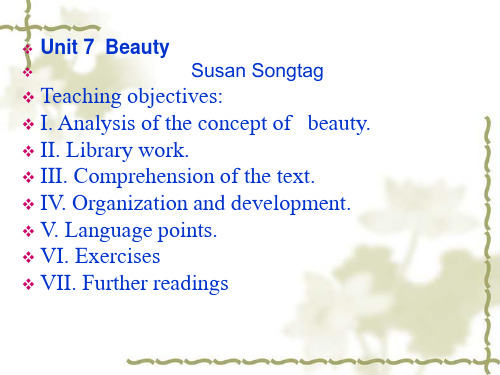
.
(8) “art for art's sake (9)John Dewey, human experience : disconnected, fragmentary, full of beginnings without conclusions (10)Marxism and Freudianism: Marxism :art is great only when it is “progressive,” Sigmund Freud art : therapeutic use。 James Joyce: The stream-ofconsciousness
The Circus by Georges Seurat
Sunday Afternoon on the Island of La Grande Jatte
Seurat’s Trombonist长号手 French artist Georges Seurat’s drawing of a trombonist (1887-1888) in chalk and conte
培根的美学与其哲学密切相关,表现出启蒙时 培根的美学与其哲学密切相关 表现出启蒙时 代的现实主义、乐观主义、唯物主义、 代的现实主义、乐观主义、唯物主义、世俗 主义和人本主义的精神意蕴。 主义和人本主义的精神意蕴。优雅合适的动 作是人的内在心灵的外在表现,在培根看来 在培根看来,内 作是人的内在心灵的外在表现 在培根看来 内 在的灵魂美高于外在的形式美。 在的灵魂美高于外在的形式美。
人生是一场悲剧 在存在主义者看来, 在存在主义者看来,人生活在一个与自 己对立的、失望的世界之中, 己对立的、失望的世界之中,人在世界上的 地位是不确定的。 地位是不确定的。绝对自由的人也是烦恼和 无所依靠的孤独者。人虽然有选择的自由, 无所依靠的孤独者。人虽然有选择的自由, 但他面对的未来的生活却是混沌而没有目标 他只是盲目地走向未来, 的。他只是盲目地走向未来,他只知道人生 的真实的终结就是死亡。 的真实的终结就是死亡。死亡作为人生的最 后归宿, 后归宿,对于个人的存在具有非常重要的意 义。
beauty by Susan sontag

炫彩PPT模版
Comments
•关毫厘之差,微妙所在。 在这种生生不息的情趣中,我们可以 见出生命的造化。 把这种生命流于语言文字就是好文章, 把它 流于言行风采,就是美满的生命史。(朱光潜《谈美》) •科学家去寻求这一类事实,穷到究竟,也正是因为它可以摄魂 震魄,所以,科学的活动也还是一种艺术的活动,不但善与美是 一体,真与美也并未隔阂。(朱光潜《谈美》)
Summary:
At the beginning of the essay, the author traces the change in people’s concept of beauty in Greeks. For Greeks, beauty is a total integrated concept of excellence. It contains the “inside” and the “outside”.
炫彩PPT模版
My opinion
Beauty can be a privilege only if its enchantment attracts men. Women can neither choose it as they like, nor damn it without social censure. In women, preening themselves can never be just a pleasure, but also a duty and work. Whatever they have achieved, people still suspend their capacity. Women can’t decide their power of beautiful. People criticize women who just presume the beauty of outlook, at the same time, they also censure that outlook beauty is alienated. Women are often in a dilemma in pursuing beauty. The oppression of women has shown the danger of depriving persons as split between “inside” and “outside”. To stave off the problem, the privilege of beauty should be kept enough distance with women.
高级英语第六版unit 7 beauty

4
Protestant Church
Catholic Church
Jesus Christ
Saint Maria
Catholics and protestants worship in many different ways however many people say they are both Christians. Both religions follow the Bible but they just believe in different things. • Catholics believe that the virgin Mary was a virgin all her life and the appearance of Jesus Cபைடு நூலகம்rist was a complete miracle. Protestants deny Mary’s virginity as they believe there was nothing miraculous about the birth of Jesus.
2
Protestantism
• Protestantism began as a movement to reform the Western Christian church in the 16th century, resulting in the Protestant Reformation, which severed the reformed churches from the Roman Catholic church.
• The declared aim of the original reformers was to restore the Christian faith as it had been at its beginning, while keeping what they thought valuable from the Roman Catholic tradition that had developed during the intervening centuries.
新编英语教程6-U7-Beauty 中英翻译
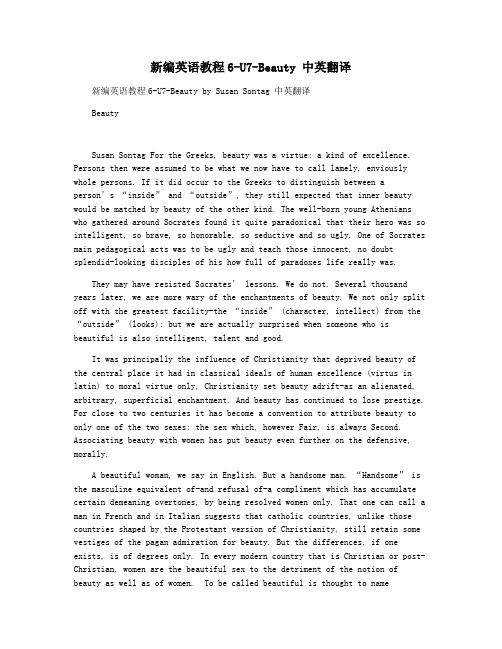
新编英语教程6-U7-Beauty 中英翻译新编英语教程6-U7-Beauty by Susan Sontag 中英翻译BeautySusan Sontag For the Greeks, beauty was a virtue: a kind of excellence. Persons then were assumed to be what we now have to call lamely, enviously whole persons. If it did occur to the Greeks to distinguish between aperson’s “inside” and “outside”, th ey still expected that inner beauty would be matched by beauty of the other kind. The well-born young Athenians who gathered around Socrates found it quite paradoxical that their hero was so intelligent, so brave, so honorable, so seductive and so ugly. One of Socrates main pedagogical acts was to be ugly and teach those innocent, no doubt splendid-looking disciples of his how full of paradoxes life really was.They may have resisted Socrates’ lessons. We do not. Several thousand years later, we are more wary of the enchantments of beauty. We not only split off with the greatest facility-the “inside” (character, intellect) from the “outside” (looks): but we are actually surprised when someone who is beautiful is also intelligent, talent and good.It was principally the influence of Christianity that deprived beauty of the central place it had in classical ideals of human excellence (virtus in latin) to moral virtue only, Christianity set beauty adrift-as an alienated, arbitrary, superficial enchantment. And beauty has continued to lose prestige. For close to two centuries it has become a convention to attribute beauty to only one of the two sexes: the sex which, however Fair, is always Second. Associating beauty with women has put beauty even further on the defensive, morally.A beautiful woman, we say in English. But a handsome man. “Handsome” is the masculine equivalent of-and refusal of-a compliment which has accumulate certain demeaning overtones, by being resolved women only. That one can call a man in French and in Italian suggests that catholic countries, unlike those countries shaped by the Protestant version of Christianity, still retain some vestiges of the pagan admiration for beauty. But the differences, if one exists, is of degrees only. In every modern country that is Christian or post-Christian, women are the beautiful sex to the detriment of the notion of beauty as well as of women. To be called beautiful is thought to namesomething essential to women’s character and concerns. (In co ntrast to men whose essence is to be strong or competent). It doesn’t take someone in the throes of advanced feminist awareness to perceive that the way women aretaught to be involved with beautyencourages narcissism, reinforces dependence and immaturity. Everybody (women and men) knows that. For it is ”every body”, a whole society, thathas identified with caring about what one is and does and only secondarily, if at all, about how one looks.) Given these stereotype, it is on wonder that beauty enjoys, at best, a rather mixed reputation.It is not, of course, the desire to be beautiful that is wrong but the obligation to be or to try. What is accepted by most women as a flattering idealization of their sex is a way of making women feel inferior to what they actually are, or normally grow to be. For the ideal of beauty is administered as a form ofself-oppression. Women are taught to see their bodies in parts, and to evaluate each part separately. Breasts, feet, hips, waistline neck, eyes, nose, complexion, hair, and so on, each in turn is submitted to an anxious, fretful, often despairing scrutiny. Even if some pass muster, some will always be found wanting. Nothing less than perfection will do.In men, good looks is a whole, something taken in at a glance. It does not need to be confirmed y giving measurements of different regions of the body, nobody encourages a man to dissect his appearance, feature by feature. As for perfection, that is considered trivial-almost unmanly. Indeed, in the ideally good-looking man a small imperfection or blemish is considered positively desirable. According to one movie critic (a woman) who is a declared Robert Redford fan, it is having that cluster of skin-colored moles on one cheek that saves Redford from be ing merely a “pretty face.” Think of the depreciationof women, as well as of beauty, that id implied in that judgment.感谢您的阅读,祝您生活愉快。
- 1、下载文档前请自行甄别文档内容的完整性,平台不提供额外的编辑、内容补充、找答案等附加服务。
- 2、"仅部分预览"的文档,不可在线预览部分如存在完整性等问题,可反馈申请退款(可完整预览的文档不适用该条件!)。
- 3、如文档侵犯您的权益,请联系客服反馈,我们会尽快为您处理(人工客服工作时间:9:00-18:30)。
美
对于古希腊人来说,美丽是一种美德:一种出色表现。
这样的人在今天会理所当然而又无不受嫉妒地被人们称为"完整"的人。
即使古希腊人真的曾经将一个个体的"内在"与"外在"区分开来,他们依然会期望这个个体的内在美能够与他其他方面的美相匹配。
当那些出身良好的年轻雅典人聚集在苏格拉底周围时,他们发现了一个非常矛盾的事实:他们的英雄是如此地睿智,如此英勇,如此高贵,如此有诱惑力——而且,如此其貌不扬。
苏格拉底用自己的丑陋给他的那些天真无邪的,无疑也是非常俊美的始徒们上的其中最重要的一节课就是:生活中充满了矛盾。
他们也许听不进去导师的教诲。
但是我们不会。
几千年以后的今天,我们变的更加小心翼翼地对待美丽之销魂。
我们不但十分轻而易举地把二者——"内在"(品质,智慧)与"外在"(外表)分割开,实际上,当我们看到一个人既漂亮同时又聪明,有才干,善良的时候,我们会感到很惊讶。
人们将美丽从古典的人类理想的中心地位中分裂出来,主要是受到了基督教的影响。
为了将出色(在拉丁文中是virtus,与美德的virtue同源)的范围缩小到仅仅是道德上的出色,基督教将美丽流放了——使它成为一种疏远的,恣意的,肤浅的诱惑。
而美丽的威望不断地流失。
在长达近两个世纪中,美丽约定俗成地变得只能用于形容两性中其中一性:即无论多么"公平对待",依然是排在"第二位"的那一性。
把美丽与女人联系起来使美丽陷入道德上愈加不利的境地。
一个美丽的女人,我们在英语中是这么说的。
但是,我们会说一个英俊的男人。
英俊是美丽的阳性的对等物,同时也是一种藐视。
美丽一词现在专用于女人,它当中积聚着一定的贬抑的弦外之音。
在法语和意大利语中,仍有称一个男性"美丽"的现象,这说明与那些被新教的基督教教义塑造的国家不同,天主教国家中还残存着一些对美丽的异端赞美的痕迹。
但是如果真的有什么区别的话,那只是程度上的。
在所有现代国家中,无论是基督教国家还是后基督教国家,女性都是"美丽的性别"——这是对美丽本身同时也是对女性本身的贬损。
渴望被称为美丽被认为是道出了女性性格的本质与她们所关心事物的核心。
(与男性形成对比——他们的核心是强壮,高效,强竞争力)不需要具有先进女权主义者的敏锐洞察力,人们也能够察觉到,女性被引导向美丽的过程实质上鼓吹了自恋主义,加重了女性的依赖性和不成熟性。
每个人(男人和女人)都心照不宣。
"每一个个体",也就全社会,都默认了"女性化"就是关心一个人看上去怎样,(与男性化的关心一个人是怎样,干得怎样,然后才有可能再关心一个人长得怎样形成了对比)考虑到这些思维定势,无怪乎美丽一词,最多只能享有一种不纯的名声。
当然,渴望美丽本身并没有错,错就错在当追求美变成了一种义务去完成,或者去尝试。
使女性觉得自己比实际的她,或者说正常成长的她要低一筹,是一种被女性广泛接受的谄媚的性别理想化。
因为追求理想的美在实际操作中已成为一种自我压抑的形式。
女性被引导去把她们身体的各部分拆分开来看待,然后独立地衡量各部分。
胸部,腿,臀部,腰身,颈部,眼睛,鼻子,肤色,头发,等等——每一样都被置于焦急的,难于取悦的,时常是近乎绝望的细察之中。
即使一些过关了,肯定还有不足之处。
不达到完美誓不罢休。
在男性那里,好看是一种整体的感觉,是匆匆一瞥留下的印象。
它不需要提供身体各部位的尺寸来确认,没有人会鼓励一个男性将自己的外表一点一点地拆分。
至于外表完美,被认为是微不足道的——甚至是缺乏阳刚之气的。
实际上,一个男人如果在外表上有一点点瑕疵,或伤痕,反而会被很正面地追捧为理想的美男子。
按照一位自称是Robert Redford迷的影评人(女性)的说法,恰恰是他脸上那一堆影响肤色的黑痔使Redford免于被认作"只有一张漂亮的脸蛋"。
不妨设想在这样的判断中所暗含的对女性和美丽本身的贬损。
Cocteau 曾说:美丽的特权是无限的。
可以肯定,美丽是一种力量。
它也配称为一种力量。
但是值得悲哀的是,这是一种绝无仅有的只有女性才被怂恿去寻求的力量。
这种力量也常常被认为和男性有关;这不是一种行动力而是一种吸引力。
这是一种否定自身的力量。
因为它不是一个人可以自由选择的,至少,由不得一个女人在未经社会许可的情况下自由选择或放弃。
对于一个女性来说,打扮自己,绝不仅仅是一种愉悦。
同时也是一种职责。
这是她的工作。
如果一个女人做了真正意义上的工作——即使攀升到政界,法律界,医学界,商界,诸如此类领域的领导地位——她仍常常被迫承认她自己依然努力使自己保持吸引力。
但是当她正努力维系两个"公平性别"的其中一性的角色之际,她的客观性,她的专业素质,权威性,思想的周密性,则备受质疑。
如果她们做,会被责难;不做,同样会被指责。
要证明将个体的内在与外在割裂开来的危险性,除了那个永无终止之日的悲喜掺半的神话之外,很难举出更加重要的例子了。
人们多么轻易地在一开始就把女性定义为自己外表的呵护者,然后再毁谤她们(或者觉得她们很可爱)为"肤浅" 的。
这是一个天然的陷阱,而它已经存在了太久。
要摆脱这个陷阱,女性自己要与美丽的出色与特权保持可观的距离。
这种距离要足够让人看清楚美丽在多大程度上被削弱了来支撑一个"女性化"的神话。
我们理应把美丽从女性那分离出来,这同时也是为了保持女性美。
